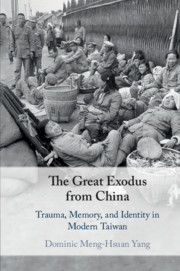Book contents
- The Great Exodus from China
- The Great Exodus from China
- Copyright page
- Dedication
- Contents
- Figures, Maps and Tables
- Acknowledgments
- Note to the Reader
- Abbreviations
- Maps
- Introduction
- 1 The Exodus
- 2 Wartime Sojourning
- 3 Cultural Nostalgia
- 4 The Long Road Home
- 5 Narrating the Exodus
- Epilogue
- Bibliography
- Index
Epilogue
Published online by Cambridge University Press: 12 September 2020
- The Great Exodus from China
- The Great Exodus from China
- Copyright page
- Dedication
- Contents
- Figures, Maps and Tables
- Acknowledgments
- Note to the Reader
- Abbreviations
- Maps
- Introduction
- 1 The Exodus
- 2 Wartime Sojourning
- 3 Cultural Nostalgia
- 4 The Long Road Home
- 5 Narrating the Exodus
- Epilogue
- Bibliography
- Index
Summary
The Epilogue summarizes the main findings of the book. It discusses mainlander identity formation in democratized Taiwan in conjunction with contemporary social survey data and the historical trajectory delineated in the preceding chapters. The discussion offers an alternative way to contemplate the current and future relationship between Taiwan and China from the perspective of conflicting historical memories. The Epilogue also reveals the author’s personal background and subject position – as a descendant of native Taiwanese political victims who tries to understand mainlander trauma. It cautions against the Caruthian psychoanalytic assumption that human suffering constitutes some kind of universal experience that will automatically bring diverse peoples and cultures together. It also questions the sociological approach’s tendency to see shared traumatic memories as mere instrumentalist “social constructs” for power and identity, which sometimes obstructs the larger ethical goals of recognition and reconciliation. Based on the author’s inner struggle and transformation in researching and writing about the misery and displacement of his perceived oppressors, the chapter proposes “multidirectional empathic unsettlements” as a modality to build historically informed cross-cultural empathy that could reconcile nations and communities with entangled but incompatible memories of past suffering.
Keywords
- Type
- Chapter
- Information
- The Great Exodus from ChinaTrauma, Memory, and Identity in Modern Taiwan, pp. 259 - 277Publisher: Cambridge University PressPrint publication year: 2020

